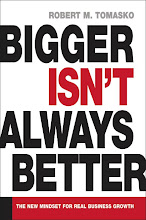August 26, 2006
Dell digs deeper
Knowing when and how to let go may be an acquired taste. It’s certainly one a number of once-stellar-performing companies, like Dell, have yet to acquire.
This weeks’ Business Week searches for the causes of Dell’s recent market decline:
A Dell competitor is quoted saying:
Bigger Isn't Always Better describes how size and success conspire to do in many companies that reach the top spot in their industries. In Dell’ case, the same operational focus that made it so formidable when it was at the top of its game is getting in the way of finding its next big thing. Instead of cultivating imagination, the stock-in-trade of every successful grower, Dell seems addicted to the fixer’s strategy of ever improving execution.
Former Dell managers say that ideas that break from the "Direct from Dell" business model are discouraged. When your market has changed, doing more of the same with greater intensity usually digs you deeper into the hole you don’t want to be in.
Link
This weeks’ Business Week searches for the causes of Dell’s recent market decline:
“… its predicament may be intractable. Dell remained slavishly loyal to its core idea of ultra-efficient supply-chain management and direct sales to consumers, even as rivals have stepped up their game and markets have shifted to take away some of Dell's key advantages. Instead of adapting, critics say, Dell cut costs in ways that compromised customer service and, possibly, product quality.”
A Dell competitor is quoted saying:
"They're a one-trick pony. It was a great trick for over 10 years, but the rest of us have figured it out and Dell hasn't plowed any of its profits into creating a new trick."
Bigger Isn't Always Better describes how size and success conspire to do in many companies that reach the top spot in their industries. In Dell’ case, the same operational focus that made it so formidable when it was at the top of its game is getting in the way of finding its next big thing. Instead of cultivating imagination, the stock-in-trade of every successful grower, Dell seems addicted to the fixer’s strategy of ever improving execution.
Former Dell managers say that ideas that break from the "Direct from Dell" business model are discouraged. When your market has changed, doing more of the same with greater intensity usually digs you deeper into the hole you don’t want to be in.
Link
August 22, 2006
Tom Peters on Bigger Isn't Always Better
It’s nice to know that Bigger Isn’t Always Better is available in airport bookshops half a world away in Bangkok. But it’s even nicer to hear that Tom Peters saw it there, picked up a copy, and made some much appreciated comments about it in his blog:
I feel especially honored by Tom’s comments. He is a pioneer business-consultant-turned-business-book-writer who paved the way for many consultants (me included) to try our hands at reaching audiences beyond those who commissioned our reports and watched our powerpoints. His incredible success with In Search of Excellence convinced many book editors (including mine) to give us rookie writers a crack at getting published.
Read his entire blog entry. He makes some great points about the futility and foolishness of building something to last. Knowing when to let go and how to share the wealth are much worthier tasks.
Link
"Now consider this from Simone de Beauvoir: 'Life is occupied in both perpetuating itself and in surpassing itself. If all it does is maintain itself, then living is only not dying.' I scrounged this marvelous [Marvelous = Abets my Life's Argument] quote from a marvelous book I picked up in the airport in Bangkok. It's Robert Tomasko's BIGGER Isn't Always Better."
"Tomasko makes a reasoned, data-rich argument that echos Simone Beauvoir. He does not, for instance, dismiss big mergers out of hand, but provides a strict definition of the few that work. This wee saving remnant uses the merger to help the enterprise perhaps "explode in a new frenzy of value creation," to paraphrase Nordström and Ridderstråle. (Immelt's unabashed aim at GE.) Tomasko, however, devotes the lion's share of the book to strategies and tactics for keeping energy and excitement going and growing in a corporation—this rarely or never encompasses growth-for-growth's sake or bigger-ness for bigger's sake. (Think Bo Burlingham's Small Giants, much praised in this Blog.) Typical chapter titles are: 'Growth Is About Moving Forward' and 'Are You a Fixer or a Grower?' "
I feel especially honored by Tom’s comments. He is a pioneer business-consultant-turned-business-book-writer who paved the way for many consultants (me included) to try our hands at reaching audiences beyond those who commissioned our reports and watched our powerpoints. His incredible success with In Search of Excellence convinced many book editors (including mine) to give us rookie writers a crack at getting published.
Read his entire blog entry. He makes some great points about the futility and foolishness of building something to last. Knowing when to let go and how to share the wealth are much worthier tasks.
Link
